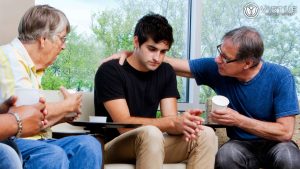Anxiety is a common stress reaction that can even be a good thing in small doses. However, when anxiety becomes chronic, it can severely impact your quality of life. It’s essential to recognize the signs of anxiety so you can seek treatment for anxiety if necessary. Virtue Recovery Killeen offers services for people struggling with anxiety and addiction. Contact our knowledgeable team at [Direct] to discuss what regular anxiety is, its difference from anxiety disorders, the signs of anxiety, and how treatment for anxiety can benefit those struggling with addiction.
Are the Signs of Process Addiction Similar to the Signs of Anxiety?
The signs of process addiction and anxiety may overlap. Symptoms like irritability, restlessness, and difficulty concentrating can be present in both conditions. Additionally, individuals with signs of process addiction may experience changes in mood, sleep disturbances, and social withdrawal, which are also common in anxiety disorders.
What Is Anxiety?
Anxiety is a natural response to stress, fear, and uncertainty. It’s a feeling of apprehension or unease about the future. Common triggers of anxiety include:- Financial problems
- Work stress
- Relationship troubles
- Health issues
- Negative self-talk
How Does Regular Anxiety Differ from Anxiety Disorders?
The signs of anxiety can range from mild to severe. Regular anxiety can be adaptive and can help you cope with stress. However, anxiety can develop into an anxiety disorder when it becomes chronic and excessive. Some common types of anxiety disorders include:- Generalized anxiety disorder (GAD)
- Panic disorder
- Social anxiety disorder
- Obsessive-compulsive disorder (OCD)
- Post-traumatic stress disorder (PTSD)
What Are the 5 Signs of Anxiety?
It can be challenging to recognize the signs of anxiety, particularly if you’re experiencing it yourself or if it’s someone close to you. Here are five common signs of anxiety:- Feeling constantly on edge – People with anxiety disorders often feel on edge. They might feel like something terrible will happen without a logical reason.
- Avoidance – Avoiding certain situations or people can be a sign of anxiety. People with anxiety disorders might avoid social situations, work meetings, or school because they fear they might have a panic attack.
- Physical symptoms – Common physical symptoms of anxiety include rapid heartbeat, sweating, shaking, and shortness of breath.
- Insomnia – Difficulty falling asleep or staying asleep can indicate anxiety.
- Irritability – People with anxiety might experience mood swings and irritability.











